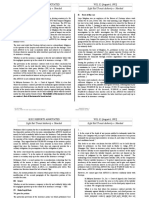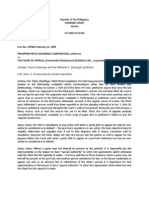Hall V Piccio
Hall V Piccio
Uploaded by
Cj GarciaCopyright:
Available Formats
Hall V Piccio
Hall V Piccio
Uploaded by
Cj GarciaOriginal Description:
Original Title
Copyright
Available Formats
Share this document
Did you find this document useful?
Is this content inappropriate?
Copyright:
Available Formats
Hall V Piccio
Hall V Piccio
Uploaded by
Cj GarciaCopyright:
Available Formats
Garcia, Christian Joseph E.
JD-2B
G.R. No. L-2598 June 29, 1950
C. ARNOLD HALL and BRADLEY P. HALL, petitioners,
vs.
EDMUNDO S. PICCIO, Judge of the Court of First Instance of Leyte, FRED BROWN, EMMA
BROWN, HIPOLITA CAPUCIONG, in his capacity as receiver of the Far Eastern Lumber and
Commercial Co., Inc.,respondents.
FACTS:
Petitioners and the respondents signed, the article of incorporation of the Far Eastern Lumber and
Commercial Co., Inc., organized to engage in a general lumber business to carry on as general contractors,
operators and managers, etc. Immediately after the execution of said articles of incorporation, the
corporation proceeded to do business. Subsequently, the said articles of incorporation were filed in the
office of the SEC for the issuance of the corresponding certificate of incorporation. Pending action, the
respondents filed before the Court alleging among other things that the Company was an unregistered
partnership; that they wished to have it dissolved because of bitter dissension among the members,
mismanagement, fraud and heavy financial losses. The court ordered the dissolution of the company. In
the present special civil action the petitioners argued: that the court had no jurisdiction to decree the
dissolution of the company, because it being a de facto corporation, dissolution thereof may only be
ordered in a quo warranto proceeding instituted in accordance with section 19 of the Corporation Law;
that inasmuch as respondents Fred Brown and Emma Brown had signed the article of incorporation but
only a partnership.
ISSUE (1):
Does a corporation exist in this case?
RULING:
No. All the parties are informed that the SEC has yet issued the corresponding certificate of incorporation.
All of them ought to know, that the personality of a corporation begins to exist only from the moment
such certificate is issued — not before (sec. 11, Corporation Law). The complaining associates have not
represented to the others that they were incorporated any more than the latter had made similar
representations to them. And as nobody was led to believe anything to his prejudice and damage, the
principle of estoppel does not apply. This is not an instance requiring the enforcement of contracts with
the corporation through the rule of estoppel.
ISSUE (2):
Was the court bereft of jurisdiction to decree the dissolution?
RULING:
No. The contention of the petitioners is premised on the theory that, inasmuch as the Company is a de
facto corporation, section 19 of the Corporation Law applies, and therefore the court had no jurisdiction
to take cognizance of said case. Section 19 reads as follows:
. . . The due incorporation of any corporations claiming in good faith to be a corporation under
this Act and its right to exercise corporate powers shall not be inquired into collaterally in any private suit
to which the corporation may be a party, but such inquiry may be had at the suit of the Insular
Government on information of the Attorney-General.
However, this section does not govern the situation. Not having obtained the certificate of incorporation,
the Company — even its stockholders — may not probably claim "in good faith" to be a corporation. The
immunity of collateral attack is granted to corporations "claiming in good faith to be a corporation under
this act." Unless there has been an evident attempt to comply with the law, the claim to be a corporation
"under this act" could not be made "in good faith."
You might also like
- Abeja v. TañadaDocument11 pagesAbeja v. TañadadelayinggratificationNo ratings yet
- FedEx Crush ReportDocument45 pagesFedEx Crush ReportKyle WeitekampNo ratings yet
- Corporation Through The Rule of EstoppelDocument1 pageCorporation Through The Rule of EstoppelJeliSantosNo ratings yet
- Frenzel-v-Catito-Digest PDFDocument2 pagesFrenzel-v-Catito-Digest PDFJoel G. AyonNo ratings yet
- JOSE MA. T. GARCIA, Petitioner, v. COURT OF APPEALSDocument1 pageJOSE MA. T. GARCIA, Petitioner, v. COURT OF APPEALSmark anthony mansuetoNo ratings yet
- Lopez Realty, Inc. v. Florentina FontechaDocument4 pagesLopez Realty, Inc. v. Florentina FontechabearzhugNo ratings yet
- 7.1 Gokongwei v. SECDocument2 pages7.1 Gokongwei v. SECI took her to my penthouse and i freaked it100% (1)
- Oblicon Page 6 DigestsDocument23 pagesOblicon Page 6 DigestsKikoy IlaganNo ratings yet
- Magsaysay vs. Agan. GR No. L-6393, January 31, 1955Document2 pagesMagsaysay vs. Agan. GR No. L-6393, January 31, 1955AJ LeoNo ratings yet
- Central Textile Mills, Inc. v. NWPC, 260 SCRA368 (1996)Document4 pagesCentral Textile Mills, Inc. v. NWPC, 260 SCRA368 (1996)inno KalNo ratings yet
- Worcester v. OcampoDocument27 pagesWorcester v. OcampoJerickson A. ReyesNo ratings yet
- PAL VS. HEALD LUMBER Batch 2 Digest Final With Court Ruling and DoctrineDocument2 pagesPAL VS. HEALD LUMBER Batch 2 Digest Final With Court Ruling and Doctrinemastaaca100% (2)
- Sarkies Tours Philippines Inc V CADocument2 pagesSarkies Tours Philippines Inc V CAjirah cheeNo ratings yet
- Vda de Maglana v. ConsolacionDocument4 pagesVda de Maglana v. ConsolacionJulia Camille RealNo ratings yet
- Gov't vs. El Hogar FilipinoDocument73 pagesGov't vs. El Hogar FilipinoElizabeth Joy CortezNo ratings yet
- GR 190112 2015 PDFDocument9 pagesGR 190112 2015 PDFAnonymous KgPX1oCfr100% (1)
- Coca-Cola Bottlers Philippines, Inc. vs. Ca and Ms. Lydia Geronimo G.R. No. 110295 October 18, 1993Document1 pageCoca-Cola Bottlers Philippines, Inc. vs. Ca and Ms. Lydia Geronimo G.R. No. 110295 October 18, 1993keithnavaltaNo ratings yet
- Prop 4 - Maneclang vs. IacDocument2 pagesProp 4 - Maneclang vs. IacBelle MaturanNo ratings yet
- Philippine Pryce Assurance Corp. vs. Court of AppealsDocument8 pagesPhilippine Pryce Assurance Corp. vs. Court of AppealsJaja Ordinario Quiachon-AbarcaNo ratings yet
- Corp, Set 2, DigestDocument18 pagesCorp, Set 2, DigestApureelRoseNo ratings yet
- CHILD LEARNING CENTER v. TAGARIODocument1 pageCHILD LEARNING CENTER v. TAGARIOHoreb Felix VillaNo ratings yet
- Development Bank of The PhilippinesDocument7 pagesDevelopment Bank of The PhilippinesJholo AlvaradoNo ratings yet
- Sy V CADocument6 pagesSy V CAHudson CeeNo ratings yet
- Reynoso v. CADocument2 pagesReynoso v. CAKen Reyes Gador0% (1)
- GR No. 157479 Turner v. Lorenzo Shipping Corp.Document2 pagesGR No. 157479 Turner v. Lorenzo Shipping Corp.Lyra GeronaNo ratings yet
- Hi-Yield Vs CaDocument14 pagesHi-Yield Vs CaRobert MantoNo ratings yet
- Pleading - Case DigestDocument30 pagesPleading - Case DigestQuennieNo ratings yet
- Main Issue For Property: Respondents' Answer:: Carandang v. Heirs of de Guzman, ADocument2 pagesMain Issue For Property: Respondents' Answer:: Carandang v. Heirs of de Guzman, ABananaNo ratings yet
- #13 Republic vs. Lat Vda. Del CastilloDocument1 page#13 Republic vs. Lat Vda. Del CastilloStolich CoronadoNo ratings yet
- Case # 1 Pmi Colleges Vs NLRCDocument1 pageCase # 1 Pmi Colleges Vs NLRCPola StarNo ratings yet
- Ponce Vs LegaspiDocument5 pagesPonce Vs LegaspiMaria Cherrylen Castor QuijadaNo ratings yet
- GMMSWM V JancomDocument2 pagesGMMSWM V JancomDebroah Faith PajarilloNo ratings yet
- 9blue Cross V OlivaresDocument3 pages9blue Cross V OlivaresGenesis LealNo ratings yet
- Emilio Cano Enterprises v. CIRDocument1 pageEmilio Cano Enterprises v. CIRAaron James PuasoNo ratings yet
- Syki-v.-Begasa - Case DigestDocument3 pagesSyki-v.-Begasa - Case DigestSelala MayoNo ratings yet
- Government V Philippine Steamship Co., Inc.Document5 pagesGovernment V Philippine Steamship Co., Inc.Cathy BelgiraNo ratings yet
- Palacio vs. Fely Transportation Co., 5 SCRA 1011 (1962)Document3 pagesPalacio vs. Fely Transportation Co., 5 SCRA 1011 (1962)VINCENTREY BERNARDONo ratings yet
- CORPO Notes 0223Document6 pagesCORPO Notes 0223Denise DianeNo ratings yet
- Midterm Answers With ExplanationDocument10 pagesMidterm Answers With ExplanationJyNo ratings yet
- Daisy Gurrea Vs LezamaDocument1 pageDaisy Gurrea Vs LezamaAllenNo ratings yet
- Heirs of Fedelina Sestoso Estella v. Estella, GR 245469, 12:9:2020Document13 pagesHeirs of Fedelina Sestoso Estella v. Estella, GR 245469, 12:9:2020bunsoNo ratings yet
- Spouses Palomo v. CADocument2 pagesSpouses Palomo v. CAJerry Cane100% (1)
- Virata V SandiganbayanDocument23 pagesVirata V SandiganbayanJeffreyReyesNo ratings yet
- 84republic V Acoje Mining Co. - Power To Establish Pension, Retirement and Other PlansDocument2 pages84republic V Acoje Mining Co. - Power To Establish Pension, Retirement and Other PlansIanNo ratings yet
- Julies Bakeshop vs. Henry ArnaizDocument2 pagesJulies Bakeshop vs. Henry ArnaizJesa FormaranNo ratings yet
- Asuncion Vs de YriarteDocument3 pagesAsuncion Vs de YriartePhrexilyn PajarilloNo ratings yet
- Personal Status Legal Personality and Capacity ReportDocument34 pagesPersonal Status Legal Personality and Capacity ReportRussel SirotNo ratings yet
- Abs-Cbn v. Hilario (Alariao)Document3 pagesAbs-Cbn v. Hilario (Alariao)Homer SimpsonNo ratings yet
- (B38) LAW 104 - Ylarde v. Aquino (No. L-33722)Document4 pages(B38) LAW 104 - Ylarde v. Aquino (No. L-33722)mNo ratings yet
- 4) Caram, Jr. v. Court of AppealsDocument2 pages4) Caram, Jr. v. Court of AppealsE Santos0% (1)
- Hilarion Beronilla Vs GSISDocument2 pagesHilarion Beronilla Vs GSISStevensonYuNo ratings yet
- G.R. No. 207161, September 08, 2015Document3 pagesG.R. No. 207161, September 08, 2015samarNo ratings yet
- Gamboa v. VictorianoDocument2 pagesGamboa v. VictorianoJay jogsNo ratings yet
- Montalegre v. Spouses de VeraDocument2 pagesMontalegre v. Spouses de VerajosephNo ratings yet
- Cruz Vs Court of Appeals: (Revocation and Reduction of Donation: Adopted Child)Document7 pagesCruz Vs Court of Appeals: (Revocation and Reduction of Donation: Adopted Child)AnsaiMendozaNo ratings yet
- Case Digests On Corporation LawDocument25 pagesCase Digests On Corporation LawGabriel Adora100% (1)
- Country Bankers Insurance v. Llanga Bay and Community Multi-Purpose Cooperative 374 SCRA 653 2002Document2 pagesCountry Bankers Insurance v. Llanga Bay and Community Multi-Purpose Cooperative 374 SCRA 653 2002Pepper PottsNo ratings yet
- City-Lite Realty Corp. Vs COURT OF APPEALSDocument5 pagesCity-Lite Realty Corp. Vs COURT OF APPEALSPatrickHidalgoNo ratings yet
- 1337840359fksu Amousp Ksa Cba 2012 FinalDocument35 pages1337840359fksu Amousp Ksa Cba 2012 FinalBojoNo ratings yet
- Pioneer Insurance & Surety Corp. vs. CA, 175 SCRA 668 (1989)Document2 pagesPioneer Insurance & Surety Corp. vs. CA, 175 SCRA 668 (1989)Nelly Louie CasabuenaNo ratings yet
- 13 Hall v. PiccioDocument1 page13 Hall v. PiccioGyelamagne EstradaNo ratings yet
- BSU-QUIZ IN LAW ON EVIDENCE 2020-Part 2Document19 pagesBSU-QUIZ IN LAW ON EVIDENCE 2020-Part 2Cj GarciaNo ratings yet
- Societat Schola Juris Societat Schola Juris Societat Schola Juris Membership Form Membership Form Membership FormDocument1 pageSocietat Schola Juris Societat Schola Juris Societat Schola Juris Membership Form Membership Form Membership FormCj GarciaNo ratings yet
- Sample Demand LetterDocument2 pagesSample Demand LetterCj GarciaNo ratings yet
- City of Malolos, Bulacan: Republic of The Philippines Regional Trial CourtDocument2 pagesCity of Malolos, Bulacan: Republic of The Philippines Regional Trial CourtCj GarciaNo ratings yet
- Quiz Christian Joseph GarciaDocument10 pagesQuiz Christian Joseph GarciaCj GarciaNo ratings yet
- Activity 1.2 - Garcia, C.Document2 pagesActivity 1.2 - Garcia, C.Cj GarciaNo ratings yet
- Acopicop v. VXI Draft Decision (Final)Document15 pagesAcopicop v. VXI Draft Decision (Final)Cj GarciaNo ratings yet
- Producers Bank Vs NLRCDocument1 pageProducers Bank Vs NLRCCj GarciaNo ratings yet
- MemorandumDocument6 pagesMemorandumCj GarciaNo ratings yet
- Del Rosario V CWDocument10 pagesDel Rosario V CWCj GarciaNo ratings yet
- OCA Circular No. 39 1997Document2 pagesOCA Circular No. 39 1997Cj GarciaNo ratings yet
- Case Digests in Civil Procedure: Garcia, Christian Joseph EDocument2 pagesCase Digests in Civil Procedure: Garcia, Christian Joseph ECj GarciaNo ratings yet
- Security Bank V Great Wall CommercialDocument1 pageSecurity Bank V Great Wall CommercialCj GarciaNo ratings yet
- Supreme Court: 1 - Crpro-R-117 - MancoDocument35 pagesSupreme Court: 1 - Crpro-R-117 - MancoCj GarciaNo ratings yet
- Resume 062419Document3 pagesResume 062419Cj GarciaNo ratings yet
- Introduction To Reward ManagementDocument43 pagesIntroduction To Reward ManagementHarsh RanjanNo ratings yet
- Types of DemandDocument7 pagesTypes of DemandsamueljamespeterNo ratings yet
- 1994-1997 Corp Law CasesDocument18 pages1994-1997 Corp Law CasesCatherine MerillenoNo ratings yet
- Bac JinmaDocument2 pagesBac JinmanicholoNo ratings yet
- Taxation On Dividends & DividendsDocument1 pageTaxation On Dividends & DividendsaceconsultantsNo ratings yet
- Dhanalaxmi Traders Annexure-18-19Document2 pagesDhanalaxmi Traders Annexure-18-19info.ashokchoudhary.icaNo ratings yet
- Maintaining Data Quality in BW Using Error StackDocument9 pagesMaintaining Data Quality in BW Using Error StackRavi TejaNo ratings yet
- Freshly CosmeticsDocument4 pagesFreshly CosmeticsGretchell BarraNo ratings yet
- Krispy Kreme Matrices/reportsDocument14 pagesKrispy Kreme Matrices/reportstalhachaudhry0% (1)
- Elektrisiteit 1eDocument6 pagesElektrisiteit 1eSanthosh RMNo ratings yet
- Amc Case StudyDocument9 pagesAmc Case StudyFranzel Ruth NovicioNo ratings yet
- Bru World CafeDocument19 pagesBru World CaferavirajmistryNo ratings yet
- Deutsche Bank ResearchDocument6 pagesDeutsche Bank ResearchMichael GreenNo ratings yet
- Tharaj Castings PVT - ltd.-1st & 2nd Phase PresentationDocument58 pagesTharaj Castings PVT - ltd.-1st & 2nd Phase PresentationAnkur DhirNo ratings yet
- 2003 Annual Report Freddie MacDocument261 pages2003 Annual Report Freddie Macnakoda121No ratings yet
- Supply Chain RelationshipsDocument34 pagesSupply Chain RelationshipsRahul KhannaNo ratings yet
- Labor Standards Sem 1 2019Document14 pagesLabor Standards Sem 1 2019Charms QueensNo ratings yet
- Sole Trader - Final Accounts: The Following Trial Balance Was Extracted From The Books of K. Kelly On 31/12/2005Document8 pagesSole Trader - Final Accounts: The Following Trial Balance Was Extracted From The Books of K. Kelly On 31/12/2005MahmozNo ratings yet
- Section I PDFDocument2 pagesSection I PDFAnonymous 7ZYHilDNo ratings yet
- StarbucksDocument2 pagesStarbucksRahul Verma RVNo ratings yet
- Santos ECO Fin HW04Document6 pagesSantos ECO Fin HW04deanyangg25No ratings yet
- LLP by Hidayah & NaziraDocument6 pagesLLP by Hidayah & NaziraNur Hidayah ZainudinNo ratings yet
- Managing Marketing AssignmentDocument12 pagesManaging Marketing AssignmentMungur AnushaNo ratings yet
- Process Groups: PMP® Process Chart Based On PMBOK® 6th EditionDocument15 pagesProcess Groups: PMP® Process Chart Based On PMBOK® 6th EditionGaurav100% (2)
- BUS 3301 Written Assignment Unit 4Document6 pagesBUS 3301 Written Assignment Unit 4Jude KCNo ratings yet
- Strategic Management Ms. Archana Vijay: Topics To Be CoveredDocument16 pagesStrategic Management Ms. Archana Vijay: Topics To Be CoveredUday GowdaNo ratings yet
- Capital Market IntermediariesDocument15 pagesCapital Market IntermediariesSebin SebastianNo ratings yet
- Level I CFA Quiz 1Document5 pagesLevel I CFA Quiz 1Kumar GaurishNo ratings yet
- Merton Truck CompanyDocument3 pagesMerton Truck CompanySeekerSingh0% (1)








































































































